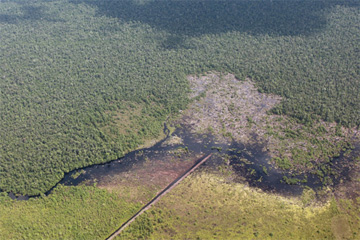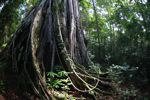An environmental audit of palm oil company, PT SMART, found that the company had not cut primary rainforest, yet had destroyed carbon-rich peatlands; however the audit analyzed only 40 percent of PT SMART’s holdings and investigated none of its plantations in New Guinea. A subsidiary of agricultural giant Sinar Mas, PT SMART has been accused in a number of reports by Greenpeace of both destroying high conservation value forests and draining peatlands. Greenpeace’s reports caused both food giants Unilever and Nestle to drop PT SMART as a supplier of their palm oil, while Cargill stated it would wait to hear the results of the audit. Given the audit’s results, both sides are claiming victory.
PT SMART is trumpeting the audit as key to turning around its tarnished image for western companies. While the company acknowledges destroying some peatlands, it’s pushing that fact that the audit found significantly less peatland destruction than alleged.
“The report concluded the allegations made were largely unfounded. SMART is not responsible for the destruction of primary forests and the destruction of orangutan habitats in Indonesia as claimed by Greenpeace,” SMART said in a statement as reported by Reuters.
For its part Greenpeace says the audit does not exonerate PT SMART, but rather supports their past reports.
 Draining and clearing of peat forest in Central Kalimantan, Indonesia. Photo by Rhett A. Butler. |
“The Sinar Mas audit largely confirms Greenpeace findings. It shows that Sinar Mas has been clearing forests and peat lands. Also it confirms that the company has been operating without the necessary permits and has been clearing deep peat illegally,” said Bustar Maitar, Greenpeace Southeast Asia Forest Team Leader. “The Sinar Mas spin is a poor attempt at brand protection that does nothing to challenge Greenpeace’s findings. We’ve repeatedly shown that Sinar Mas says one thing and does another. They destroy peatland and call it water management. They clear rainforests and say that they’re developing degraded land.”
While PT SMART was not found to have cleared primary rainforest, it did clear secondary forest, which studies have shown in some cases possess considerable biodiversity, if not to as much as primary forest. However secondary forests are often considered ‘degraded’ land in Indonesia and therefore open to clearing.
In response to the audit’s findings, Unilever says it will not purchase palm oil from PT SMART again until the company is certified by the Roundtable on Sustainable Palm Oil (RSPO).
Indonesia, in an effort to lower its greenhouse gas emissions by 41 percent by 2020 from a projected baseline, has announced a moratorium on granting new forest and peatland concessions to companies beginning in January 2011. However, environmentalists are concerned that the lag time between the announcement and the commencement of the moratorium will lead to a bonanza of new forest concessions being handed out. In addition, Indonesia has yet to say how it will define ‘forests’. To help it lower deforestation Indonesia has received $1 billion from Norway and $136 million from the US.
“No nation on Earth is losing forest faster than Indonesia—at a rate of roughly 1.5 million hectares a year,” Frans Bongers, President of the Association for Tropical Biology and Conservation (ATBC) said in a statement during a recent meeting in Indonesia. “This is one of the most serious environmental threats we face anywhere.”
Related articles
Longtime target of green groups, Cargill, to supply sustainably-certified palm oil to Unilever

(07/30/2010) Agriculture giant Cargill has announced an agreement to supply Unilever with 10,000 metric tons of palm oil sustainably-certified from the Round Table for Sustainable Palm Oil (RSPO). Cargill has often come under fire from green groups for being linked to the rainforest destruction. The Dutch-English company Unilever—the world’s biggest buyer of palm oil—has been trying to move its palm oil sources away from deforestation with a goal of sourcing only ‘sustainable’ palm oil by 2015.

(07/23/2010) Scientists convening at the annual Association for Tropical Biology and Conservation (ATBC) meeting in Sanur, Bali urged Indonesia’s leaders to strengthen measures to protect the country’s biologically-rich ecosystems. In a resolution issued on the final day of the five-day conference, ATBC commended Indonesia for recent moves to protect forests, including a pledge to cut illegal logging and a billion dollar partnership with Norway to reduce deforestation and forest degradation, but asked the government to immediately implement a planned moratorium on new forestry concessions on peatlands and primary forest lands.
Large-scale forest destruction in Sumatra undermines Indonesia’s deal with Norway

(07/13/2010) While the Indonesian government basks in a recent agreement with Norway to slow deforestation to the tune of a billion US dollars, a new report by Eyes on the Forest shows photographic evidence of largely government sanctioned deforestation that flouts several Indonesia laws. Potentially embarrassing, the report and photos reveal that two companies, Asian Pulp and Paper (APP) and Asia Pacific Resource International (APRIL), have destroyed 5 percent of Riau province’s forests since 2009, including deep peatlands, high conservation value forests (HCVF), Critically Endangered Sumatran tiger habitat, and forest within the Giam Siak Kecil- Bukit Batu UNESCO Biosphere Reserve. In total, over 130,000 hectares (an area larger than Hong Kong) of mostly peat forest were destroyed for pulp.







